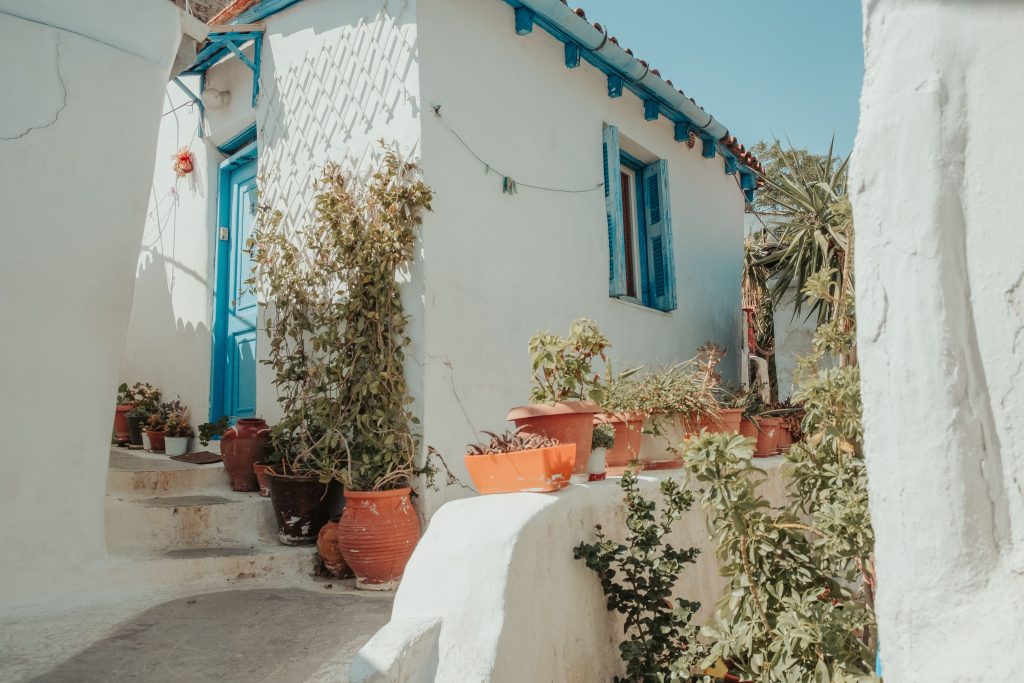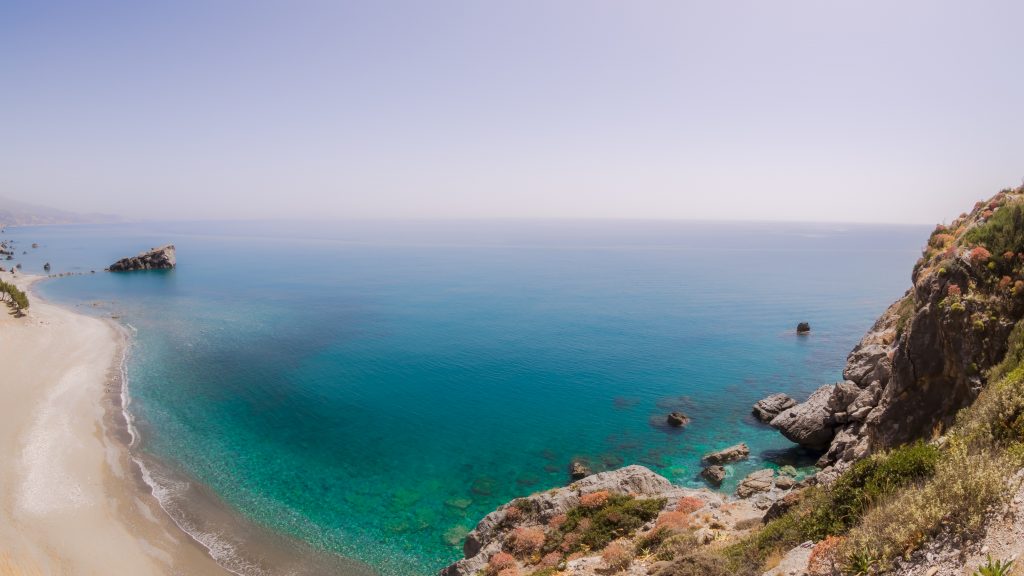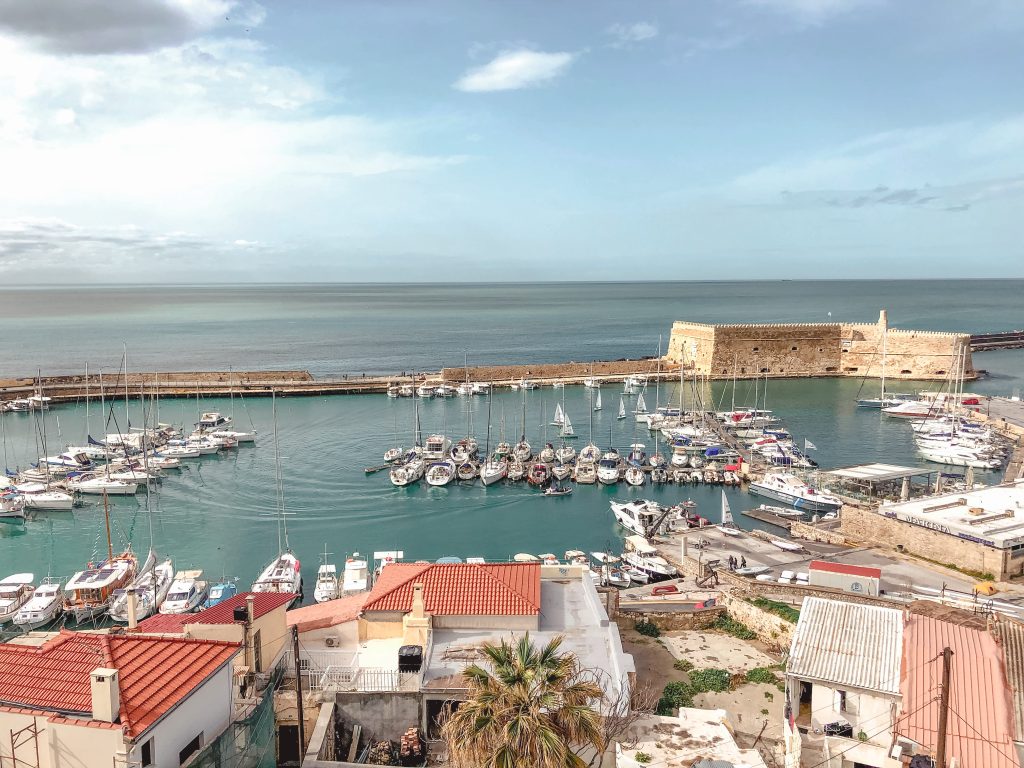Wondering what to wear in Greece? Located in the south of Europe, Greece is a small country with a large legacy. Hugged by the Mediterranean sea from all directions except the North, which connects to the Balkans, Greece offers the promise of magic to anyone who has the opportunity of visiting her lands.
Although usually thought of as a summer destination, Greece has an array of places and activities to explore throughout the year. In fact, Greece boasts incredible diversity in terms of terrain, weather and activities throughout the country.
Greek Weather & Destinations
When thinking about all the places that one can visit when embarking on a journey to Greece, typically the first destinations that come to mind are Athens and the vast array of islands (though a few are significantly more famous than others, such as Santorini, Mykonos or Corfu). However, there is an incredible number of places to explore.
Perhaps the best way to illustrate Greece’s diversity is to recall a tourism campaign that aired a few years ago. In this campaign, visitors are urged to “meet the world in Greece”. Photographs of various destinations in Greece are compiled and labelled as other parts of the planet (or universe), but a smaller font underneath revealed that these places are in fact in Greece. For instance, a picture showcasing what at first sight looks like the Amazon rainforest is, in fact, the island of Kithira. Similarly, an image of an otherworldly terrain is labelled as the Moon, only to reveal underneath that it is, in fact, the island of Milos. An image labelled as Bali is revealed to be Kavala. The list continues…
Greece combines old and new perfectly. After all, this is to be expected of a nation globally revered for its ancient history. With such an expanse of choice in where to visit and what to do in Greece, it only makes sense that when choosing what items of clothing to bring along on your journey you consider the activities you will be undertaking, as well as the season in which you will be visiting.
Let us clear one thing up from the get-go, Greece is not always hot. If you are visiting in the winter, you will most certainly need a winter jacket. Snow is likely, and in fact, if your inner skier wants to come out and play there are several ski resorts that you can explore in the winter time.
Colder weather in Greece prevails primarily between November and March. With the onset of spring also come warmer temperatures, but the climate does enjoy being temperamental so you should expect the occasional rain. The same applies for the autumnal season. Throughout the summer, you are more or less guaranteed beautiful (but extremely strong) sunshine and high temperatures, though in recent years summer has also been graced by the occasional (albeit very rare) storm.
Throughout this article, we will initially look at all the universal packing list, this includes all the items that you are likely going to need no matter where and when you visit Greece. Once we have gone through that, we will break down our suggestions on what to wear depending on the type of holiday. Whether you plan on visiting the cities, islands or more rural mainland, we have got you covered with everything you could possibly need.
Essentials for a Greek Holiday
When looking at the universal essentials, we are looking at all the items that you will need regardless of where in Greece you are going and when. This is your core packing list, which you will then opt to embellish with selected items depending on your destination.
Essentials for Greece
- Passports and IDs
- Tickets – of your flights, or ferries
- Hard copy of your accommodation details
- Money (Euros)
- Cards – remember to tell your bank that you are travelling
- Underwear
- Socks
- Clothes that are easily layered – though more on this later
- Pyjamas
- Comfortable shoes for travel and exploring
- Sunglasses
- Everyday bag that is secure and easy to carry, for travel and exploring purposes
Travel Gear for Greece
- Phones
- Chargers
- Power adapters – to make your plugs from your original country compatible to those in Greece. Type C, E & F plugs will work in Greece.
- Kindle
- iPad
- Laptop
- Headphones / earphones
- Battery Pack
- Book(s)
Toiletries & Health
- Toothbrush, toothpaste, floss
- Deodorant
- Perfume, cologne
- Face and/or eye cream
- Makeup, and makeup remover
- Hairbrush
- Shampoo, conditioner (though your hotel may provide these)
- Shaving kit
- Aftershave
- Nail clippers, scissors, nail file (these would have to be put in your checked luggage. You could carry a paper nail file in your carry on).
- Tweezers
- Contact lenses and solution
- Prescription glasses
- Facewash
- Suncream for your body and face (very important if you are travelling to Greece in the summer. We suggest a minimum of 30 SPF as the sun can be very strong).
- After sun, and sunburn relief (aloe vera gel is a really good option here).
- Feminine hygiene products
- Prescription medications, along with a copy of your prescription.
- Mosquito repellent (particularly important in the summer)
Greek City Breaks
Often referred to as the “cradle of Western civilisation” and the “birthplace of democracy” Athens, the capital city, is arguably the most well-known city in Greece. Dominating the Attica region, Athens is the largest Greek city as well as one of the world’s oldest, with a recorded history spanning back over 3400 years. A centre for the arts, learning and philosophy, Athens is a city with a rich history and heritage just waiting to be explored.
When choosing your attire it is necessary to consider the season during which you will be in Athens and the activities you will be undertaking. Generally speaking, Athens is similar to any other European capital city, particularly in the way people are clothed.
The overall style that prevails has an air of smart-casual, so a pair of jeans with a nice top and comfortable shoes are an excellent outfit for your day to day activities. If you want to dress up to dine at one of the many restaurants or drink at one of the many bars, it is advised that women opt for wedges, or a nice pair of sandals in the summer, over heels, as heels can be problematic on the cobbled streets. For men, a pair of nice trousers or jeans topped off with a shirt and a nice pair of shoes (not trainers), is the perfect outfit for an evening out.
Athens is home to two UNESCO world heritage sites, the Acropolis and the Medieval Daphni Monastery. If you choose to visit the Acropolis you will have to walk uphill for quite some time, so for this activity, you need a comfortable pair of walking shoes. If you are going to see the Acropolis in the summer, then you ought to dress in clothes that are breathable and light in the heat; you will also need a hat, sunscreen, sunglasses and a bottle of water. When visiting in the summer, either go early in the morning or in the afternoon when the sun is not at its strongest. On the other hand, if you are going in the winter, you will need a jacket and perhaps an umbrella.
Athens may get all the attention in Greece, but we must not forget the country’s second largest city Thessaloniki in the northern part of the country. Thessaloniki is the capital city of the Macedonian region and is located in the northwest corner of the Aegean Sea, on the Thermaic Gulf. Renowned for its festivals, events and vibrant cultural life, Thessaloniki is also home to Aristotle University, the largest in Greece and in the Balkan region. Although in some ways Thessaloniki is more of a student city, the dress code remains more or less the same – opt for smart-casual attire, and you will be ready for any occasion.
City Break Packing list
- T-shirt(s)
- Shirt(s) – in the hot summer months, linen is an excellent breathable fabric.
- Jeans – though if it is very hot, jeans can be too heavy a fabric.
- Lightweight trousers for the summer.
- Sundress(es)
- Skirt(s)
- Short(s) – though not too short, really short shorts are best kept for the beaches.
- Walking shoes – must be comfortable, as walking is the best way to explore the cities.
- Sandals – a must have in the summer.
- Boots – a must have in the winter.
- Wedges – for more formal occasions. Wedges are a safer option over heels, as many roads can be cobbled, and uncomfortable to walk in stilettos.
- Jacket – for the winter, as it can get very cold.
- Cardigan – even for the summer in air-conditioned spaces, a cardigan is a good thing to pack. Occasionally, even in the hot summer months, the evenings can become chillier.
- Shawl/scarf – to keep you warm in the winter amongst your other layers, and to keep you warmer in air-conditioned spaces in the summer.
- Everyday bag – something that you can match with all of your outfits and that is secure and spacious for you go have everything you need whilst exploring. Note that Athens has a high rate of pick-pocketing so always be vigilant with your belongings.
- Nice handbag/clutch – for more formal occasions.
- Swimming suit – in the event that you are staying in a hotel that has a swimming pool.
Greek Islands
The Greek islands are made up of 6000 islands and islets, of those, 227 are inhabited. Whether you are island hopping or staying in one place for a super relaxing holiday, Greece has a plethora of interesting and beautiful islands for you to explore.
The Greek Archipelago takes up approximately 16km of the Greek coastline, offering a hugely diverse landscape: from beaches stretching over kilometre upon kilometre to sheltered bays and coves, sandy beaches, pebble beaches, coastal caves, and beaches with dark coloured sand – typical evidence of volcanic soil and coastal wetlands. Home to some of the oldest European civilisations (Cycladic, Minoan…), many islands boast a distinctive architectural heritage, with sets of fascinating local traditions. What is more, many of the Greek beaches have been awarded under the Blue Flags of Europe Programme, offering not only a sparkling opportunity to swim but also scuba diving, snorkelling and many water sports such as waterskiing, sailing and windsurfing to name a few.
Depending on the activities you want to undertake, there is most certainly a group of islands for you. From relaxing by the beach to embarking on active water sports, to partying at world famous destinations, in Greece you can do just about all of it.
Island attire is more relaxed than city attire, however some islands are also more conservative than others, so whereas in some places (Mykonos, for example), you could go into the centre of town during the day in your swimsuit and cover-up, on other islands (Chios, for example) this is not so acceptable, and you should opt for actual clothes. Each island is different, possessing diverse forms of natural beauty and sets of customs, and arguably this is their charm.
Greek Islands Packing List
- T-shirt(s)
- Blouse(s)
- Shirt(s) – linen and cotton are the best fabrics, as they are breathable and comfortable. The islands can get hot and humid.
- Lightweight trousers – linen and cotton again are some of the best options for fabrics. Jeans can get too hot and sweaty on the islands, though sometimes in the evening if the temperature cools a little, jeans can be a good option.
- Sundress(es)
- Skirt(s)
- Short(s)
- Sandals
- Comfortable shoes – most if not all islands boast gorgeous cobbled streets in their towns. Bring shoes that you can walk in happily. If you need a height boost, ladies, then opt for wedges as those offer more stability on the unstable surfaces.
- Flip flops – note that if you have to scale down a steeper path to get to the beach, you should wear shoes or sandals that protect your feet and don’t have a slippery sole.
- Cardigan – although in the summer the stands are hot and humid, in the evenings they can get chillier. Mykonos, for example, is known as the windy island, with winds soaring through quite a lot of the summer. Whilst during the day the wind is usually a welcome break from the hot climate, in the evenings it can get quite cool temperature-wise.
- Shawl/scarf – an excellent alternative to a cardigan.
- Everyday bag – something that you can match with all of your outfits and that is secure and spacious for you go have everything you need whilst exploring.
- Beach bag – something you don’t mind getting sandy and possibly wet. Make sure this is spacious enough for all your necessities.
- Nice handbag/clutch – for more formal occasions.
- Swimsuits – on the islands you will definitely need more than one!
- Swimming trunks (men).
- Swimsuit cover-ups – from sarongs to beach dresses, to a pair of shorts and a t-shirt. Anything could be added to the cover-up list, as long as you don’t mind getting it wet. Swimsuit cover-ups are necessary for your transport to and from the beach or swimming pool, and they always add a great stylish, beachy and relaxed tone to your overall look.
- Suncream – extremely important, the sun is very strong in Greece and becomes particularly stronger once you are by the beach.
- Beach towel – your hotel may provide these for you also.
- After sun – you will definitely need to hydrate your skin after a full day of sitting on the beach and taking in the sun’s rays.
- A good book – as great as people watching is whilst on the beach, there are few things better than delving into a good book with the background sounds of waves crashing onto the beach.
- Hat(s)
- Sunglasses
- Mosquito repellent
Greece Mainland Explorations
Whilst most first-time travellers to Greece often opt to visit the islands and Athens, many returning visitors find that the mainland maintains a lot of the more traditional qualities and customs of the country.
The mainland offers a plethora of destinations and activities for the traveller to embark upon. From the heart and soul of Greece in the Peloponnese (after all, Greece’s first capital was in Nafplio), to the wild and natural beauty of Ipiros there is a lot to see in the mainland.
Similarly, you can opt for a more relaxing beach oriented holiday, or you can visit the villages further inland. You could even explore one or more of the many trails that are perfect for hiking or biking.
The mainland, like the islands, is rich in history, and whilst the whole country is sprinkled with an array of archaeological sites, you are most likely going to be exploring this side of historical Greece in the mainland. As such, packing the right things is advised and the list certainly differs from the city and island packing lists.
Greece Mainland Packing list
- T-shirt(s)
- Blouse(s)
- Shirt(s) – in hotter months, linen and cotton are your best friends. If you are going during any other season then you have free reign on your fabrics of choice.
- Trousers – you will need variety depending on what you are doing. If you are going hiking you will need trousers with multiple pockets, good breathable fabric and long enough to protect from stray floral and fauna that can scratch and wildlife such as snakes.
- Lightweight trousers – linen and cotton again are some of the best options for fabrics in the summer.
- Jeans
- Sundress(es)
- Dress(es)
- Skirt(s)
- Short(s)
- Sandals
- Comfortable shoes that you can walk happily in. Archaeological sites can be tricky to get to, and the aged marble and stone can also be slippery so make sure one of the pairs you pack has a good grip.
- Hiking boots – if you plan on hiking.
- Hiking socks
- Flip flops
- Cardigan
- Jacket – for colder seasons.
- Windbreaker
- Shawl/scarf
- Everyday bag – something that you can match with all of your outfits and that is secure and spacious for you go have everything you need whilst exploring.
- Nice handbag/clutch – for more formal occasions, if for example, you want to dress up a little bit more for a nice dinner.
- Swimming suits
- Swimming trunks (men).
- Swimming suit cover-ups – on the mainland these are strictly for the beach. If you plan on exploring towns and villages you need to dress properly.
- Suncream – extremely important, the sun is very strong in Greece and becomes particularly stronger once you are by the beach.
- Beach towel – your hotel may provide these for you also.
- After sun.
- Hat(s)
- Sunglasses
- Mosquito repellent – especially in the summer.
Advice & Tips for Packing
A holiday in Greece is a particularly easy one to pack for, after all it is a European country known primarily for its tourist hotspots. However, if you plan on escaping to some of the quieter, and more untouched parts of the country it is important to remember that locals there may be slightly more conservative.
Greece does not have any unspoken rules about attire such as “cover your shoulders”, or “wear long skirts, dresses, trousers” like India for example, but as with everything an element of common sense in deciding what you are going to pack is imperative. If you plan on visiting churches or monasteries, you are going to be asked to cover up. Many such places of worship do have spare clothing that you can put over your own if you have not dressed appropriately, and if they do not have this facility you will be turned away.
If you are visiting the archaeological sites make sure you bring appropriate footwear, these landmarks have been there longer than any of us could fathom and keeping them pristine and protected is vital.
If you are hiking, bring appropriate clothing for this activity and read about the local wildlife that you may encounter. Although Greece does not have many dangerous or particularly terrifying animals, some areas are home to venomous snakes, bears or wolves.
Greece’s beauty and diversity is unparalleled, and whilst a one time visit is definitely not going to be enough to see all that she has to offer, spending some time researching all of the activities you would like to undertake in your chosen destination is always a good way by which to think ahead for what you will need to pack.









Leave a Reply